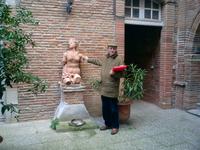| Monday, December 8, 2003 |
| Historical Toulouse |
 Americans in Toulouse are frequently arranging these historical walking tours lead by Gilbert. I've been on a few and it is is always interesting, even if it is on the local cemetary, or just looking at some old houses. Gilbert is a historian who knows his stuff, like the dates and names of apparently everything and everyone who was reasonably important within the last 1000 years or so in Toulouse. Where most people just walk down the street without thinking much about it, he seems to have a lot to say about every other house. Here he dragged us into a backyard of a house where a well-known manufacturer of statues was living. The morning was spent in the St.Cyprien quarter, close to where we live. Since it is on the left bank of the river, away from the rest of the city, that is where they first placed a hospital, so they could drag people over there who were suffering from the plague. And it was cheap land for an assortment of different monasteries and convents. Americans in Toulouse are frequently arranging these historical walking tours lead by Gilbert. I've been on a few and it is is always interesting, even if it is on the local cemetary, or just looking at some old houses. Gilbert is a historian who knows his stuff, like the dates and names of apparently everything and everyone who was reasonably important within the last 1000 years or so in Toulouse. Where most people just walk down the street without thinking much about it, he seems to have a lot to say about every other house. Here he dragged us into a backyard of a house where a well-known manufacturer of statues was living. The morning was spent in the St.Cyprien quarter, close to where we live. Since it is on the left bank of the river, away from the rest of the city, that is where they first placed a hospital, so they could drag people over there who were suffering from the plague. And it was cheap land for an assortment of different monasteries and convents.[ History | 2003-12-08 07:41 | 4 comments | PermaLink ] More > |
| Individuals working for the world |
 In 1927 as Buckminster Fuller was standing at the edge of Lake Michigan, intent on committing suicide by throwing himself into the dark, cold water, he instead hesitated and started thinking about what meaning his life could have. For the first time doing some thinking he felt was his own. And he asked himself what one penniless little human could possibly do for humanity that the most powerful governments and corporations couldn't do better. In 1927 as Buckminster Fuller was standing at the edge of Lake Michigan, intent on committing suicide by throwing himself into the dark, cold water, he instead hesitated and started thinking about what meaning his life could have. For the first time doing some thinking he felt was his own. And he asked himself what one penniless little human could possibly do for humanity that the most powerful governments and corporations couldn't do better."Answering myself, I said: "The individual can take initiatives without anyone's permission."Now, get that. One individual working for all of humanity. Applying all of your energy and intelligence to making the biggest possible positive difference for the whole world. But doing it completely on your own premises. Not sacrificing yourself to the will of some homogonous group. Not just trying to tweak the best advantage for yourself out of life. No, doing the very best you can, in the way that only you can know how to do - not for yourself, not for any particular group, but for all of us together. There's nothing quite as powerful as that. It is a profound statement, a profound intention. And not just some idealistic do-good kind of thing to say. It is maybe the most sensible thing to do. Many years later, two years before he died, Bucky wrote a book called "Critical Path" in which he summarized much of what he had learned. This is part of what he wrote in the foreword: "My reasons for writing this book are fourfold:Notice that it is at first not always easy to read what he wrote. After his two years of self-imposed silence he then only wrote and spoke in very precise statements that pack quite some wisdom into each sentence, but which uses many made-up words. However, if you get used to it, you'll appreciate how clearly the man was saying things. OK, so again he's talking about how we might make the world work optimally for all of us. First of all how we might possibly save humankind from imminent extinction. Not by some political or religious ideology. Not through any organization that claims to be working on such big matters. No, through well-informed individuals, who come to realize what they're here to do, and who go and do it, in accordance with their own integrity and intuition. And such individuals then freely joining their actions with the actions of others. I went and picked those quotes out because I was thinking about the principles of the open source movement, and about how I better can do something useful in the world. Notice that most people who're developing open source software are following the principles outlined above, even if the individuals doing so might not at all resonate with the lofty aims described. But it ads up to the same thing. If you develop some little software utility just to scratch your own personal itch, but you actually put it out into the world for others to freely use, and it turns out that it is useful for others too - you're doing exactly that. You, as an individual, are guiding your actions by your own intuition and decisions, not taking direction from any authoritative group outside yourself, doing it entirely you own way, and you give your work to the world with few or no strings attached. If the world just worked a few percent more like that, the tides would turn. If more works were put into the world by people who did exactly what they think is needed, without caring whether it pays or whether power groups might agree or not. If more big and small problems were solved for all of us by smart people doing whatever they damned well felt like. Little by little, the pool of tools and resources supporting humanity is growing. And, one by one, organizations that hold on to power for its own sake, for their own sake, or for the sake of some dried-up idealistic principles - will fall apart and fade away. Just because they don't work as well as a network of free people who serve the world. They never have, but it is not beginning to be clear before now. Anyway, I will be searching for a better understanding of what it means to be working in that way. Indeed, it doesn't have to be something big and noble and idealistic at all. It can be simply doing little useful things that need to be done, and making them as available as possible, [ Inspiration | 2003-12-08 14:43 | 7 comments | PermaLink ] More > |
| Turning off the auto-pilot |
 Andy Borrows' Older and Growing blog is always a good read. In particular, Andy has a compellingly authentic voice. Andy Borrows' Older and Growing blog is always a good read. In particular, Andy has a compellingly authentic voice."I’ve been feeling oddly ill-at-ease for the last week or so, and couldn’t figure out why. Disconnected, running on autopilot, remote from experience; definitely a few cards short of a full deck. I’ve been bouncing half-formed ideas around my head trying to figure out the cause of the malaise; I started writing blog posts several times but abandoned them every time - the words kept falling into one of a number of stereotyped patterns, running away with themselves, finding their own course like heavy rain falling on a dusty hillside.See, how many of us wait to write and speak until we have something figured out, until we have something smart to impart to the world. But the best stuff in life is often the reality of where we are right now, halfway through a lot of things we haven't figured out, and which we might or might not. And when we embrace that, and are able to be in it and talk about it, revelations tend to show up. Like, read on in Andy's post. [ Inspiration | 2003-12-08 15:59 | 2 comments | PermaLink ] More > |